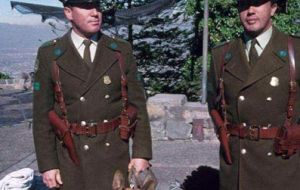MercoPress. South Atlantic News Agency
Over 35.000 Carabineros mobilized for Chile’s Sunday election
 Police is watching the activities of up to 40 suspected squatter anarchist groups allegedly responsible for recent bombings with home-made devices
Police is watching the activities of up to 40 suspected squatter anarchist groups allegedly responsible for recent bombings with home-made devices Chile's police force (Carabineros) this week outlined plans to protect the eight million voters expected to participate in Sunday's presidential election. Over 35,000 officers will be mobilized nationwide to ensure the election takes place smoothly, with Carabineros giving special attention to possible anarchist bomb threats.
Police presence has been stepped up this week at several hotels, banks and embassies around Santiago, all of which have been targeted by bomb threats within the past month. Carabineros are currently watching the activities of up to 40 suspected squatter anarchist groups with the aim of preventing any attacks this weekend.
Police sources claim that over 200 hoax bomb threats have been made in recent months, including a false alert that forced the closure of Santiago's Baquedano metro station on November 19.
Last year there were 21 bombings across Chile and all blamed by authorities on anarchist groups. Twenty have been reported so far this year.
Among these was a Nov. 15 noise bomb that exploded in a local McDonald’s restaurant, leaving no one injured. But a bomb left in a Marriott Hotel bathroom on Nov. 4 left six injured.
The same bomb used in the Marriott bombing was used last year on Oct. 2, when a suspect left a bomb at SOFOFA (a business lobbying group) headquarters in Las Condes. In that case, police were able to deactivate the bomb.
Away form the anarchist threat, extra patrols will police roads in Chile's southern region of Aruacania (Region IX) which is the centre of tension amongst native Mapuche groups and local business interests.
Carabineros hope to prevent a continuation of recent attacks on tourist buses and freight trucks in the area which have been blamed on Mapuche gangs.
Meanwhile, members of Chile's armed forces will provide tight security around many Santiago polling stations.
The Chilean Red Cross also announced that its volunteers will offer medical assistance at polling stations across the country to those struggling with the expected high temperatures. Bicycle ambulances will operate at some of the biggest stations in Santiago, including three at the Estadio Nacional.
The stadium will be the country's biggest voting centre and its use in the democratic process has huge symbolism for many Chileans.
In the aftermath of the 1973 military coup - which toppled the elected government of President Salvador Allende and replaced it with a dictatorship led by Gen. Augusto Pinochet - the stadium was used to imprison over 12,000 political opponents of the new regime.
Sunday’s election will be Chile's fifth presidential election since the country's return to democracy in 1989. The four presidents that have ruled the country since belong to the Concertación, a coalition which includes Christian Democrats, Socialists and other smaller parties. The elected heads of state were Patricio Aylwin (CD); Eduardo Frei (CD); Ricardo Lagos (Socialist) and currently Michelle Bachelet (Socialist).
However the latest opinion polls indicate Conservative Sebastián Piñera is leading and could become Chile’s next president. He is supported by an alliance of conservative parties some of them dating back to the days of Pinochet.




Top Comments
Disclaimer & comment rulesCommenting for this story is now closed.
If you have a Facebook account, become a fan and comment on our Facebook Page!